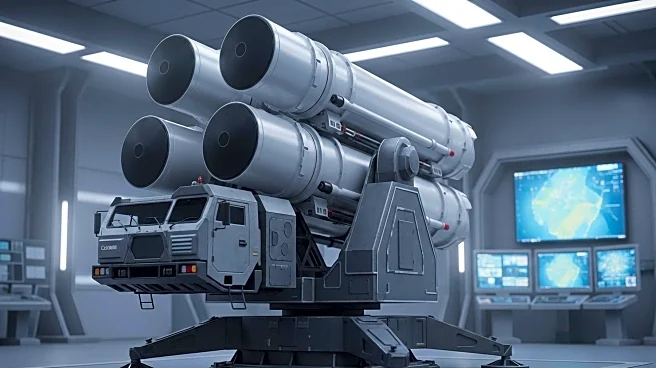What's Happening?
The U.S. Department of State has approved a potential Foreign Military Sale (FMS) to Ukraine, involving up to 3,350 Extended Range Attack Munition (ERAM) missiles. This sale, valued at approximately $825 million, includes the Rusty Dagger air-launched cruise missile, developed by Zone 5 Technologies. The package also comprises Embedded GPS/Inertial Navigation System modules and Selective Availability Anti-Spoofing Modules for enhanced GPS precision. Ancillary items such as missile containers, launch pylons, spares, support, software, and training are part of the deal. Funding is provided by Denmark, the Netherlands, Norway, and U.S. Foreign Military Financing. The Defense Security Cooperation Agency highlighted the collaboration with NATO allies to deliver this system swiftly.
Why It's Important?
This sale underscores the U.S. commitment to supporting Ukraine amid ongoing regional tensions. By enhancing Ukraine's military capabilities, the U.S. aims to bolster its defense posture against potential threats. The involvement of NATO allies in funding reflects a collective effort to maintain stability in Eastern Europe. For U.S. defense contractors like Zone 5 Technologies, this deal represents a significant business opportunity, potentially leading to further contracts and technological advancements. The sale also signals a strategic alignment among Western nations to counterbalance geopolitical adversaries.
What's Next?
Following the approval, the next steps involve finalizing the contract details and logistics for the delivery of the missiles and associated equipment. Ukraine will likely integrate these systems into its defense strategy, potentially prompting reactions from neighboring countries. The U.S. and its allies may continue to monitor the situation closely, adjusting their military and diplomatic strategies as necessary. Further collaboration on defense initiatives between the U.S., NATO allies, and Ukraine could be anticipated.
Beyond the Headlines
The sale raises questions about the long-term implications for regional security dynamics. It may influence the military strategies of other Eastern European countries and could lead to an arms race in the region. Additionally, the ethical considerations of arms sales in conflict zones may be debated among international observers and policymakers.









